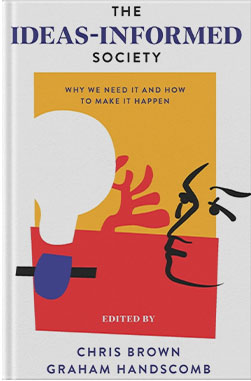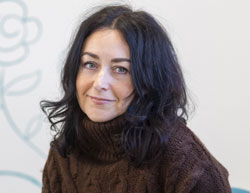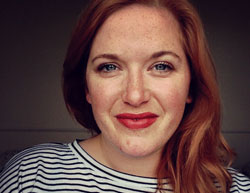The aim of this co-produced project is to better understand how people engage with evidence in order to make decisions in their daily lives, be those big or small decisions.
We want to understand what sources people look to for information, and how those sources, as well as other factors in their lives, affect their views and decision making. Democratic societies thrive when citizens actively and critically engage with new ideas, developments and claims to truth so engaging with the best available evidence and using it to make decisions is crucial.
What we want to explore with this project is how close we are to this type of situation and what might be done to improve it – by both academia and publishers.
Prof Chris Brown on the ideas-informed society project
In this video, Professor Chris Brown introduces the ideas-informed society project, and outlines four key areas the work aims to explore.

Exploring an “ideas-informed” society in the modern world
Vibrant democratic societies need citizens that engage with new ideas, developments, debates, and discussions.
Faced with a world of environmental, social, and political crises, there appears to be a shift away from this ideal "ideas-informed" society
View infographic View research paper
Read the infographic transcript
Exploring an "Ideas-Informed" Society in the Modern World
Vibrant democratic societies need citizens that engage with new ideas, developments, debates, and discussions.
Faced with a world of environmental, social, and political crises, there appears to be a shift away from this ideal "ideas-informed" society.
How do we foster an "ideas-informed" society in the modern world?
A survey of 1,000 voting-age citizens in England was conducted to get the following insights:
- How do individuals keep themselves up to date?
- What is the impact of staying up to date on society?
- Which factors contribute to citizens staying up to date?
The survey found that:
- Many people keep up to date through news and newspapers, social media and blogs, but also through popular science and current affairs magazines, journals, or books.
- Factors like education and occupation affect the importance that citizens attach to values like diversity and equality fundamental to democratic society:
- In citizens with a lower level of education or professional skill: mentality of scarcity could lead to limited focus only to immediate needs
- Among citizens with a higher level of education or professional skill: there is a larger likelihood of staying up to date
- Levels of education and occupation and network of friends influence staying up to date:
- When less educated individuals get grouped together: they become less likely to seek to stay up to date
- Individuals who discuss news and currents affairs with friends: are more likely to value the importance of staying up to date
- Individuals with manual occupations but not low education levels: have a higher propensity to stay up to date
In order to foster an ideas-informed society with up-to-date citizens and an engaging public discourse, we need improved dialogue between all members of society and higher levels of education for all.
Achieving the 'ideas-informed' society: results from a Structural Equation Model using survey data from England
Emerald Open Research | Chris Brown et al. (2022) | DOI: 10.35241/emeraldopenres.14487.1

The Ideas-Informed Society: Why We Need It and How to Make It Happen
By Chris Brown & Graham Handscomb
Symposium

The project team delivered a symposium at the 2023 BERA conference.
The symposium was convened by Sharon Parkinson, the discussant was Graham Handscomb, with Chris Brown and Ruth Luzmore presenting findings.
BERA Annual Conference: 12 – 14 September 2023
Venue: Aston University, Birmingham, UK
Symposium: Tuesday 12th September, 1:30 – 3:00pm
Find out more about the BERA Conference 2023
Whenever life changing ideas occur, sparks of inspiration have become flames and these flames served to positively light up the world (Oliver, 2021). With this in mind, the notion of the ideas-informed society represents a desired situation in which: 1) citizens see value in staying up to date, and 2) citizens regularly keep themselves up to date by actively, openly and critically engaging with new ideas, developments and claims to truth (Brown et al., 2022a).
Research indicates that beneficial outcomes potentially materialise such a situation. These include that: 3) citizens can become more knowledgeable; 4) citizens find themselves better positioned to make beneficial decisions/achieve personal fulfilment, and; 5) citizens aligning their perspectives with appropriate societal values.
Despite these benefits, there are substantive numbers of people who are ‘ideas-refusers’: i.e. citizens who see little value in engaging with ideas (Brown et al., 2022b). Typically these individuals reside in communities characterised by low levels of education.
At the same time, such individuals (as well as the communities within which they reside) stand much to gain from becoming increasingly knowledgeable, better positioned to make good decisions, and from being more likely to adopt progressive beliefs and norms. As such, this symposium explores recent work to promote the ideas-informed society and what it currently tells us.
Closing the impact gap
We know that part of the journey to real-world impact relies on making research both accessible and engaging for policy-makers, communities, and end-users.
But do current research formats effectively communicate to these groups?
Are you in?
We’re relaunching our Real Impact Manifesto and asking you to join us in working towards a fairer, more equitable environment where research can have a real-world impact and those within it can reach their full potential.
We outline six commitments where we can work together for change, including finding new formats and channels to disseminate research – will you join us?

Our goal for quality education for all
We believe in quality education for everyone, everywhere and by highlighting the issue and working with experts in the field, we can start to find ways we can all be part of the solution.
Our goal is to help researchers to share their work, and partner to find ways to break down the divides so there is equal opportunity to access quality education and participate in higher education, training and work, with a voice that is heard. We believe everyone should have a chance to be the best they can be regardless of where they started.
Get in touch
If you would like to find out more about this project, please fill out the form and one of our team will be in touch.



 Professor Chris Brown is Head of Southampton Education School at the University of Southampton and Distinguished Visiting Professor, University of Tübingen.
Professor Chris Brown is Head of Southampton Education School at the University of Southampton and Distinguished Visiting Professor, University of Tübingen. Jana Groß Ophoff works at the University College of Teacher Education (Vorarlberg, AT). Jana researches teacher education, research-informed education, and educational assessment and evaluation.
Jana Groß Ophoff works at the University College of Teacher Education (Vorarlberg, AT). Jana researches teacher education, research-informed education, and educational assessment and evaluation.
 Ruth is a former Primary headteacher, a PhD candidate at the University of Warwick, and an early career researcher with an interest in all things education particularly leadership and policy.
Ruth is a former Primary headteacher, a PhD candidate at the University of Warwick, and an early career researcher with an interest in all things education particularly leadership and policy.

